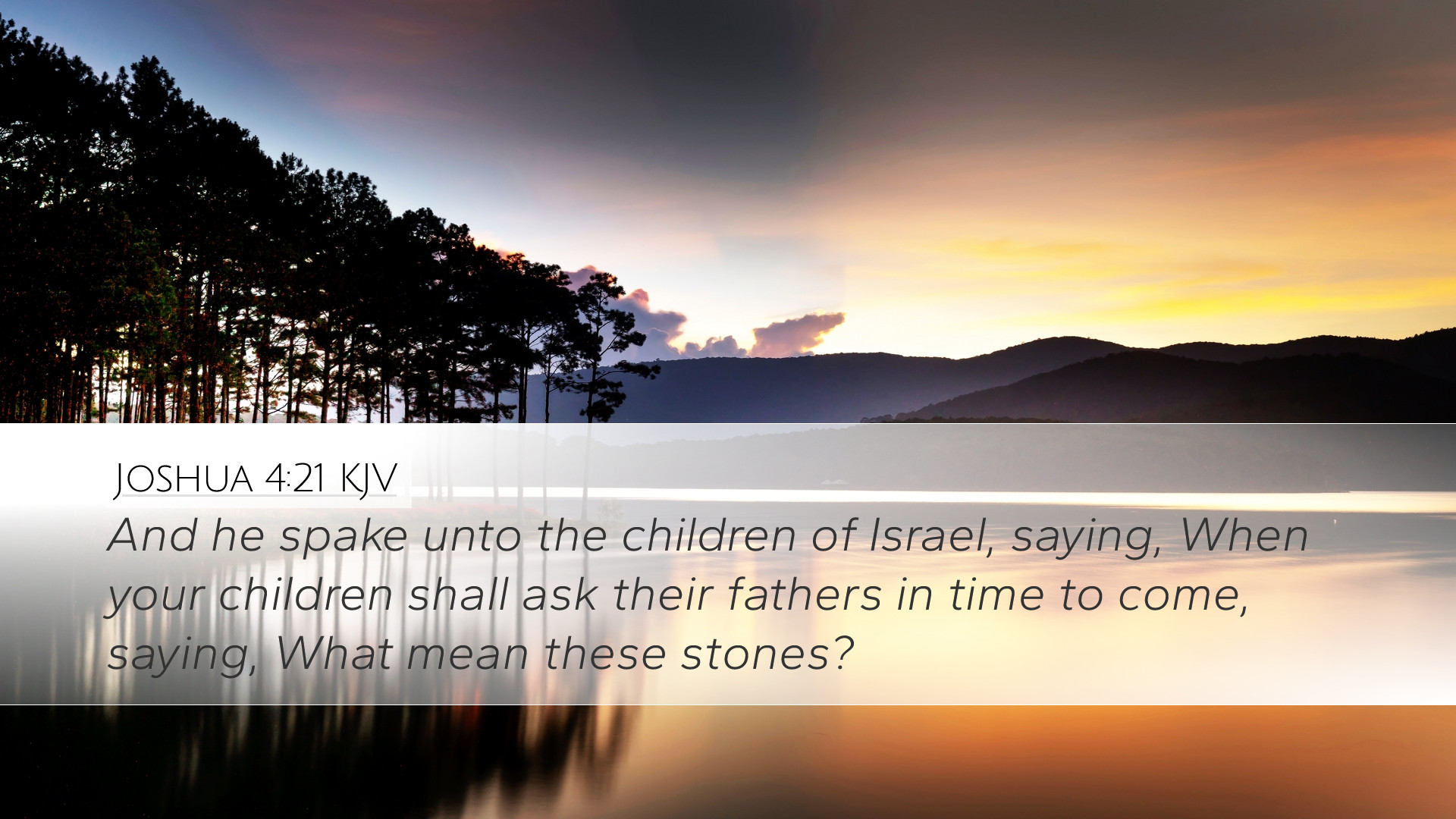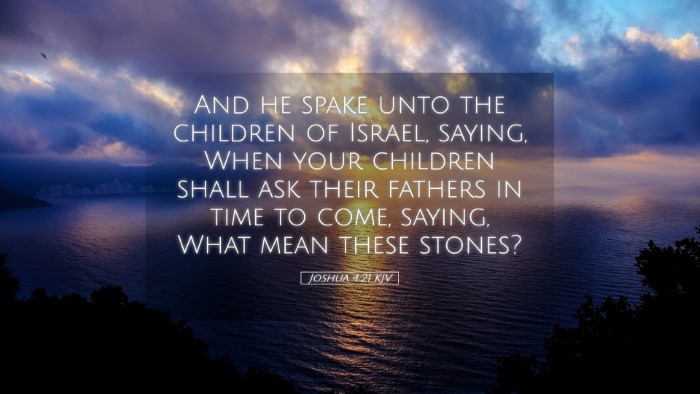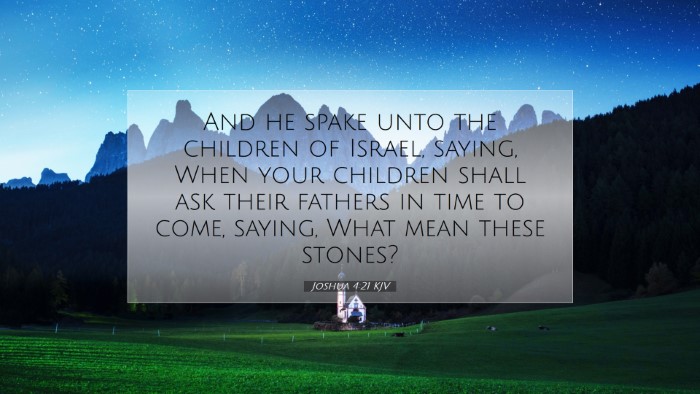Old Testament
Genesis Exodus Leviticus Numbers Deuteronomy Joshua Judges Ruth 1 Samuel 2 Samuel 1 Kings 2 Kings 1 Chronicles 2 Chronicles Ezra Nehemiah Esther Job Psalms Proverbs Ecclesiastes Song of Solomon Isaiah Jeremiah Lamentations Ezekiel Daniel Hosea Joel Amos Obadiah Jonah Micah Nahum Habakkuk Zephaniah Haggai Zechariah MalachiJoshua 4:21
Joshua 4:21 KJV
And he spake unto the children of Israel, saying, When your children shall ask their fathers in time to come, saying, What mean these stones?
Joshua 4:21 Bible Commentary
Commentary on Joshua 4:21
Verse Text: "And he spake unto the children of Israel, saying, When your children shall ask their fathers in time to come, saying, What mean these stones?"
Introduction
The account of Joshua 4:21 is a significant moment in the history of Israel as they transitioned into the Promised Land. This verse serves as a pivotal teaching moment for future generations, encapsulating the need for remembrance of God's actions and faithfulness. This commentary combines insights from renowned public domain commentators to provide an in-depth exploration of the implications of this verse.
Contextual Overview
The events leading to Joshua 4:21 involve the Israelites crossing over the Jordan River. God commands Joshua to set up twelve stones as a memorial to remind the nation of the miraculous crossing. This action not only signifies God's power but also establishes a lasting heritage of faith and teaching to children about God's deeds.
The Significance of Remembrance
Matthew Henry highlights the importance of memorials in the life of faith, arguing that “God’s providences call for remembrance.” This verse underscores the critical duty of parents and leaders to instill in their children the narratives of faith. The act of remembering, according to Henry, serves as a bridge for the future generation to connect with God’s mighty acts.
Children as Inquirers
Albert Barnes emphasizes the natural curiosity of children, noting that their questions about the stones symbolize a larger inquiry into God's nature and His working in human history. The verse not only anticipates these questions but encourages them. This interaction becomes a critical teaching moment, inviting discussion about faith and God's providential care.
Raising Questions of Faith
Adam Clarke elaborates on the implication of the children's inquiry, suggesting that the stones are not merely a point of curiosity but serve a didactic purpose. He asserts that such moments should prompt adults to articulate their faith, recounting not just historical facts but also imparting theological truths about God's character and covenant.
Pedagogical Responsibility
This verse mandates a pedagogical responsibility on the part of adults in the faith community. It highlights the duty of parents and leaders to prepare for inquisitive minds. Henry asserts, "Families should expect that their children will be curious about their faith." Thus, when children inquire, it is an opportunity for parents to share knowledge and instill a deep understanding of God’s salvation history.
The Function of Testimony
Barnes notes that this act of testimony enhances the anchor of faith within families. By teaching their children about the stones, leaders reinforce their belief in God's ongoing presence and activity. Such testimonies provide not only historical context but spiritual validation that sustains belief and encourages future generations to trust in God.
Theological Implications
This verse serves not only as a narrative account but also bears significant theological implications. It stresses God's faithfulness across generations and His desire for relational remembrance. Clarke notes that God is deeply invested in ensuring His people understand their shared history and identity in Him. This contributes profoundly to the foundations of covenant theology.
Application for Modern Believers
For pastors, students, theologians, and scholars today, the message of Joshua 4:21 calls for reflection on how contemporary believers can create lasting memorials in their lives and communities. It prompts questions about the effectiveness of our teaching methods and the storytelling techniques we employ to pass down faith.
- Creating Memorials: What tangible practices, rituals, or symbols do we employ to remind ourselves and our children of God’s faithfulness?
- Engaging Curiosity: How can we encourage questions of faith within our families and congregations, and respond to them with meaningful answers?
Conclusion
Joshua 4:21 serves as an enduring reminder of the importance of remembrance in the life of faith. As Matthew Henry, Albert Barnes, and Adam Clarke elucidate, the act of recalling God’s deeds fosters not just individual faith but a communal identity. It emphasizes the need for pedagogical engagement with future generations, ensuring that the stories of God’s faithfulness continue to inspire and shape the lives of believers.


